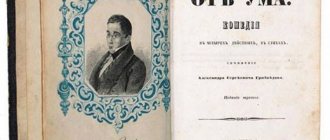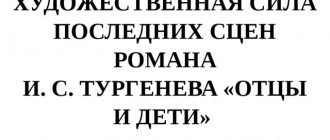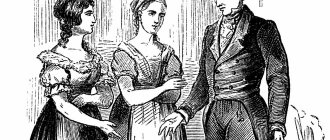The meaning of the comedy title Woe from Wit
“Woe from Wit” A.S. Griboedova is an ageless classic. The years have no power over this amazing comedy. The characters in the work can be found in everyday life. Why does comedy attract the attention of so many readers? What is the meaning of the title “Woe from Wit” by A.S. Griboedova?
Intelligence and stupidity. The title of the comedy clearly reflects the contrast between extremely important human characteristics. With age, a person should become wiser, because year after year he gains experience. But is this really so?
Woe from the mind is an event that can happen to every educated person. A.S. Griboedov, with the help of comedy, shows that intelligence is an extremely dangerous quality for many people.
The problem with the title “Woe from Wit”
Laughter through tears. Woe from the mind. The author expresses the problems of society in a ridiculous form. You can't take life seriously. It is impossible to know and be able to do everything. A.S. Griboyedov created a comedy, the purpose of which is not only to diversify people’s pastime, but also to tell what worries each of them.
The work begins with a paradoxical combination in the title. What did the author mean by this? For many, the protagonist's intelligence is expressed in madness. People around you don't take the character seriously. Over time, the hero has an epiphany. He realizes that society does not hear or understand him.
The meaning of the title of the work
The characters described by A.S. Griboyedov, live among us. The title “Woe from Wit” speaks for itself. There are people who have intelligence. And there are those who can be classified as fools. But who is who? Alexander Sergeevich does not clearly say who is stupid and who is the opposite.
Based on the title, you can understand that the work contains a conflict between intelligence and stupidity. But how do you define a smart person? By what criteria is stupidity demonstrated? Where is the standard to be compared to?
The positive hero of the play is consumed by internal contradictions. He is uncomfortable in the society in which he is. He opposes himself to everyone. The hero fights for justice, honesty, truth. But will he win this battle? A.S. Griboyedov shows him as lonely, not accepted by anyone, funny. "Smart". The author calls the hero this with a grin.
A.S. Griboedov already says in the title that it’s not good to be smart. There is no need to constantly argue, because everyone has their own truth. Everyone has their own ideals and values. You need to strive to achieve inner comfort without forcefully imposing your point of view on anyone. Even a wise, experienced person can become a hostage to his own mind.
The comedy “Woe from Wit” by A. S. G. Riboyedov, work on which was completed in 1824, is an innovative work in terms of issues, style, and composition. For the first time in Russian drama, the task was set to show not just a comedic action based on a love triangle, not mask images corresponding to the traditional roles of classicist comedies, but living, real types of people - Griboyedov’s contemporaries, with their real problems, not only personal, but also social conflicts.
He spoke very accurately about the peculiarities of the construction of the comedy “Woe from Wit” in his critical sketch “A Million Torments”. I.A. Goncharov: “Two comedies seem to be nested within one another: one, so to speak, private, petty, domestic, between Chatsky, Sofia, Molchalin and Liza: this is the intrigue of love, the everyday motive of all comedies. When the first is interrupted, another unexpectedly appears in the interval, and the action begins again, a private comedy plays out into a general battle and is tied into one knot.”
This fundamental position allows us to correctly evaluate and understand both the problems and the heroes of the comedy, and therefore, understand the meaning of its ending. But first of all, we need to determine what kind of ending we are talking about. After all, if, as Goncharov convincingly puts it, there are two intrigues, two conflicts in a comedy, then there should be two endings. Let's start with a more traditional - personal - conflict.
In the comedies of classicism, the action was usually based on a “love triangle”, which consisted of characters with a clearly defined function in the plot and character. This “role system” included: a heroine and two lovers - a lucky one and an unlucky one, a father who has no idea about his daughter’s love, and a maid who arranges dates for the lovers - the so-called soubrette. There is some semblance of such “roles” in Griboedov’s comedy.
Chatsky would have to play the role of the first, successful lover, who in the finale, having successfully overcome all difficulties, successfully marries his beloved. But the development of the comedy and especially its ending refute the possibility of such an interpretation: Sophia clearly prefers Molchalin, she gives rise to gossip about Chatsky’s madness, which forces Chatsky to leave not only Famusov’s house, but also Moscow and, at the same time, give up hopes for Sophia’s reciprocity . In addition, Chatsky also has the traits of a hero-reasoner, who in the works of classicism served as an exponent of the author’s ideas.
Molchalin would fit the role of a second lover, especially since the presence of a second - comic - “love triangle” (Molchalin - Liza) is also associated with him. But in fact, it turns out that he is the one who is lucky in love, Sophia has a special affection for him, which is more suitable for the role of the first lover. But here, too, Griboyedov departs from tradition: Molchalin is clearly not a positive hero, which is mandatory for the role of the first lover, and is portrayed with a negative author’s assessment.
Griboedov departs somewhat from tradition in his depiction of the heroine. In the classical “role system”, Sophia should have become an ideal heroine, but in “Woe from Wit” this image is interpreted very ambiguously, and in the finale she will not have a happy marriage, but deep disappointment.
The author deviates even more from the norms of classicism in his depiction of the soubrette, Lisa. As a soubrette, she is cunning, quick-witted, resourceful and quite courageous in her relations with gentlemen. She is cheerful and relaxed, which, however, does not prevent her, as befits her role, from taking an active part in the love affair. But at the same time, Griboyedov endows Lisa with traits that are quite unusual for such a role, making her similar to the hero-reasoner: she gives clear, even aphoristic characteristics to other heroes, formulates some of the most important positions of Famus society (“sin is not a problem, rumor is not good,” and golden bag, and aims to become a general” - about Skalozub).
Famusov in the “role system” plays the role of a noble father who has no idea about his daughter’s love, but by changing the traditional ending, Griboyedov deprives this character of the opportunity to safely complete the development of the action: usually in the end, when everything was revealed, a noble father who cares about his daughter’s happiness , blessed the lovers for marriage and it all ended with a wedding.
Obviously, there is nothing like that in the finale of “Woe from Wit.” Famusov really doesn’t know anything about the real state of things until the very end. But even there he still remains blissfully unaware of his daughter’s true passions - he believes that Sophia is in love with Chatsky, and he doesn’t even think about Molchalin as the object of his daughter’s sighs, otherwise everything would have ended much worse, especially for Molchalin, Certainly. Indeed, in addition to what the role of a noble father implies, the image of Famusov includes the features of a typical Moscow “ace”, a big boss, a master who is not used to his subordinates allowing themselves much lesser liberties - it’s not for nothing that Molchalin is so afraid of showing sympathy for him on Sophia’s part, despite all the girl’s precautions:
And it makes me shiver so much,
And at one thought I’m afraid,
What Pavel Afanasyich times
Someday he'll catch us
He will disperse, he will curse!.. -
Molchalin complains to Lisa. And all the other participants in this “triangle” went so far beyond their roles precisely because, when creating realistic images, Griboedov could not endow them with any standard set of features. And as full-blooded, living images, they began to behave completely differently from the rules of classicism.
Responding to accusations of “lack of a plan,” that is, exactly what was just said, Griboedov argued that, on the contrary, his plan was “simple and clear in execution. The girl, who is not stupid herself, prefers a fool to an intelligent man.” You probably can’t say more precisely. And as a result, it turns out that even in something that somehow still retained a connection with the traditions of classicism, Griboyedov acted as a true innovator. His heroes in their personal sphere behave as, alas, quite often happens in life: they make mistakes, are at a loss and choose a clearly wrong path, but they themselves do not know this.
So, Sophia was clearly mistaken about Molchalin, but she believes that the quiet young man is actually like the noble heroes of the sentimental novels that she loves to read so much. At the same time, preferring to command rather than obey, she sharply rejects the noble, but overly ardent, sometimes even fiery in disputes, Chatsky, who manages to inadvertently offend Molchalin, so dear to Sofia’s heart. As a result, instead of entertaining and making the girl laugh, Chatsky provokes a storm of her anger. She takes cruel revenge on the unlucky lover: she spreads gossip about his madness into society. But she herself will be deeply disappointed: Molchalin turns out to be an ordinary careerist and scoundrel.
Don't be mean, stand up...
Reproaches, complaints, my tears
Don’t you dare wait, you’re not worth it, -
Sophia angrily throws it at Molchalin, who has been caught lying to her, but insight comes only in the finale.
But Chatsky is also in for a very unexpected discovery. From the very beginning, he lived in the world of his illusions: for some reason he decided that Sophia, after his unexpected departure from Famusov’s house three years ago, still treated him with the same sympathy, although we see no reason for this - after all, he I didn’t even write letters to her. Then, finally feeling her coldness, he begins to look for a rival - and finds him in the person of Skalozub, again without any reason in Sophia’s behavior or words. She is an independent girl and can hardly easily accept her father’s opinion about the young and promising colonel. She has her own ideas about her husband, however, they are also somewhat reminiscent of the traditional image of a husband-boy, a husband-servant for Famus society.
Chatsky still had a suspicion about Molchalin as a possible rival when Sophia fainted after seeing him thrown off by a horse. But Chatsky cannot take the girl’s position; he is too convinced of his judgments, including those about Molchalin, which means, in his opinion, Sophia cannot love such a person. By some very strange logic, he, having heard Sophia unrestrainedly praising Molchalin, draws a paradoxical conclusion: “She doesn’t respect him. ... She doesn’t give a damn about him.”
So Griboyedov leads the action to a logical ending: the collapse of the illusions of all the main characters. But such an ending is motivated not from the point of view of the traditional “role system”, but from the position of the psychological appearance of each of the heroes, the internal motivation of their actions, resulting from the individual characteristics of the characters.
As we can see, everything in Griboedov’s work does not go “by the rules”: the characters are not the same, and the plot develops in the wrong way, and in the finale, instead of the traditional happy-end, everyone expects the collapse of illusions and hopes. By the way, this “irregularity” of the comedy caused a negative assessment among many of Griboedov’s contemporaries, although, of course, true art connoisseurs, who immediately appreciated the innovative nature of the work, gave very high reviews of it. And yet, even Pushkin, as we know, did not accept this work in all respects; in particular, Chatsky’s character seemed unconvincing to him, apparently precisely because he retained the features of a reasoning hero.
But the play also has another line of development, which means the ending of another conflict. In it, Chatsky, as a representative of the young progressive-minded generation of Russia of that era, enters into an unequal struggle with Famus society - that conservative majority that does not want to accept anything new: neither in politics, nor in social relations, nor in the system of ideas, nor in the usual way of life . He is one against everyone and the ending of the conflict is, in fact, a foregone conclusion: “Chatsky is broken by the amount of old power,” as Goncharov wrote.
Although Chatsky despises Famusov’s society, expulsion from this society is still painful for him: he grew up here, Famusov once replaced his father and, no matter what you say, he loves Sophia, and therefore he really suffers, receiving his “millions of torments”, which gives the ending of the comedy even a tragic sound:
Who was it with? Where fate has taken me!
Everyone is driving! Everyone curses! Crowd of torturers!
And yet, if his collapse in love is absolutely obvious, then the question of whether Chatsky’s expulsion from Famus society can be called a victory over the hero remains open. “Get out of Moscow! I don’t go here anymore,” Chatsky shouts in despair. But the world is wide, in it you can find not only a place “where there is a corner for an offended feeling,” but also your like-minded people, your own business in life. After all, if we agree with the legitimacy of comparing Chatsky with the Decembrists - and this was done by Griboedov’s contemporaries, the Decembrists themselves, with whom the author of “Woe from Wit” was well acquainted - then we only have to admit that the dispute between heroes like Chatsky and the old foundations is only begins.
Continuing the conversation about the significance of the finale of the clash between Chatsky and Famusov’s society, Goncharov noted that, in spite of everything, the hero dealt the conservatives “a fatal blow with the quality of fresh strength.” It may be somewhat premature to talk about a “deadly blow,” but it is obvious that the once monolithic Famus society has indeed given a breach - and Chatsky is to blame for this. Now there is no rest for the old Moscow “aces” and noble ladies, because there is no confidence in the inviolability of their positions, although they are still strong. Goncharov is absolutely right in calling Chatsky “an advanced warrior, a skirmisher,” who is always also a victim - such is the fate of those who go first.
And perhaps the main meaning of the finale of Griboyedov’s comedy “Woe from Wit” for us is that a person who dares to go first in an era of turning point, the replacement of one century by another, the collapse of old ideas and the emergence of new sprouts, must be ready to sacrifice himself. Always, at all times, woe to the mind that dared to oppose new concepts to generally accepted ones. But praise also to the person who can keep such a mind free and sound, despite all the vicissitudes of his personal fate.
The meaning of the work Woe from Wit
The title of Griboedov's comedy looks like an oxymoron, because it is generally accepted that the smarter a person is, the better, but this is the special meaning of the title. The high intelligence of the protagonist, his sharp and daring statements do not find understanding among representatives of the old world. But the desire for the truth and the desire to prove that he is right does not allow the character to stop in time and turn the conversation into a more familiar and primitive direction for ordinary people. Such a public demonstration of an exceptional mind leads to negative consequences for the main character and not only for him. The plot is based on two conflicts - love and social. And if the love line is more likely to follow the canons of classicism, then the social conflict, which runs like a red line through the entire work, constantly appearing in the dialogues of the characters, is intended to reveal the general meaning of the comedy. “Woe from Wit” clearly spells out the main vices of society of that time: lies, hypocrisy, servility, conservatism, hypocrisy and, of course, stupidity.
Chatsky's ideas, as a representative of the new time, are unacceptable to the ossified Moscow nobility; they seem unnecessary, absurd and even dangerous. It is easier for representatives of the old times to believe in Chatsky’s madness than to admit that his freethinking may carry some meaning. The image of Chatsky is a prototype of a romantic hero, a lonely fighter against the system, whose methods are too radical for his time and therefore meaningless. Griboyedov makes it clear that the time of enlightenment in Russia has not yet arrived, but a new generation of thinking people who will be able to change something is already beginning to appear.




